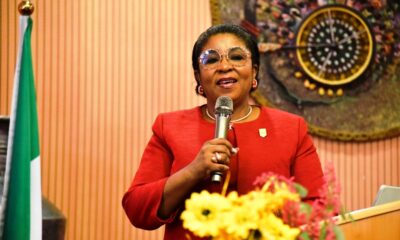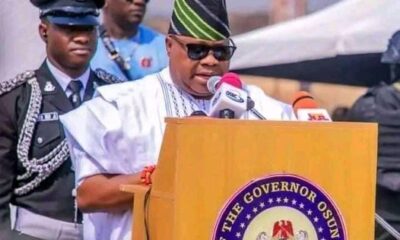Opinion
For Gains Of Amnesty To Endure
At last we are beginning to see glimpses of a blue sky over the Niger Delta region. The stormy clouds have lifted: the blinding lightening has ceased and the clattering thunder has died down. This clement condition is possible largely because of the unconditional amnesty that President Umaru Musa Yar’;Adua granted repentant militants.
It came as a big relief when the likes of Henry Okah, Ebikabowei Ben ( alias Boyloaf ), Ateke Tom. Government Ekpemupolo (a.k.a Tompolo) and other militants accepted the amnesty programme. This development is a remarkable breakthrough for the government as sceptics never gave the pacification strategy any chance of success.
Indeed. the success that the amnesty initiative has recorded so far marks a turning point in the effort of President Yar’Adua to translate one of his seven-point agenda into reality. This much was acknowledged by the Director General of the European Union. Mr. Stefano Manservisi. while disclosing that his organisation had set aside 90 million Euros to support the post-amnesty programme. He said: “’This is indeed a very important turning point and we welcome it very much. We at the EC will urge the government of Nigeria to continue the effort of sustainable rehabilitation and reintegration of the former militants”. One cannot but agree.
The President of the Movement for the Survival of the Ogoni People (MOSOP), Mr. Ledum Mitee also captured the essence when he said that the amnesty “should be a process and not a one-off thing.” The major task now is to change the mindset of the youths who have become accustomed to using violence to achieve their goals. They must be made to appreciate the virtues of dialogue in conflict resolution. In addition, they must also recognise that there is dignity in embracing decent means of livelihood.
This cannot be achieved by giving the repentant militants red carpet reception in Aso Rock. Flying them into Abuja with presidential jets gives the impression that the government is glamourising militancy. Yes. the militants need to be appeased but it is wrong to cast them in the mould of regional role models. According to a former oil minister. Prof. Tam David-West the entire process was too razzmatazzed’ and politicised to give the profound event a real soul.
Again, we must not lose sight of the fact that amnesty is only a prelude to finding satisfactory solutions to the main cause of the crisis in the region. which is lack of’ development. It must, therefore be followed with several programmes that would rapidly and significantly transform the oil-bearing communities. The needed massive development should go alongside a well organised re-orientation. training and retraining programmes for the youths. Their bursting energies and world view should be properly channelled towards productive ventures.
The steps taken so far towards addressing the anomalous situation in the oil-rich Niger Delta seem to focus only on repentant militants or those who claim to be the ‘“kings of the creeks.” Unfortunately, this approach is defective and in fact counterproductive, as the army of unemployed youths in the rogion may be tempted to enlist into militant camps just to attract attention. Of course. they would aspire to be accorded presidential attention and royal treatment as is currently being given to the ex-militant leaders. To guard against another resurgence of militancy, there should be an all-inclusive re-orientation and empowerment of the youths irrespective of whether they were former militants or those who have always embraced the peace alternative.
Indeed, the re-orientation should not be limited to seminars and workshops in highbrow venues such as Abuja, Lagos. or other cities in the Niger Delta. To reach the youths at the grass roots, the training and re-training programmes should be taken to the schools, churches, town hall meetings and market squares in the villages and creeks. The recent post amnesty seminar organised by the Bayelsa State Government in Kaduna. though well-intentioned. took place in a wrong location. Obviously, that event was not meant for the youths of the Niger Delta. who should constitute the target audience of such a gathering. It can best be described as an ill-advised political jamboree, mainly for political heavy-weights. especially those of northern extraction. It nevertheless provided a platform for the Speaker of the House of Representatives. Mr. Dimeji Bankole to take swipes at Niger Delta political leaders. whom he accused of conspiring to squander the resources entrusted to them.
What the Niger Delta youths need now are programmes that would reshape them and make them better human beings., They should not just be trained and left to grope in the dark alleys of the unemployment market. The should he mentored to fully imbibe the habits of managing their own businesses successfully. This is very important as the President of National Institute of Marketing of Nigeria. Chief Lugard Airniuwu explains: “while training is just about knowledge, mentoring takes care of the total human being. It moulds and shapes the person’s beliefs and values. You use mentoring to lift the person to another level of confidence.”
The youths of the region should be made to see achievement-oriented and honest leaders of the region as their role models. Certainly not the militant leaders. some of who have used violent means to traumatise the nation. Yes, some of the ex-militant “generals” had good intentions when they started the struggle, which is to draw attention to the neglect of their region. Even then, they don’t have to spill the blood of fellow Niger Deltans to achieve their goal.
Credit must be given to the Non-Violence Training Programme for Youths initiated by the Niger Delta Development Commission. NDDC. in 2008. The scheme. which was introduced as part of the strategies adopted by a Think Tank on the Niger Delta is aimed at reforming the youths who may have resorted to anti-social activities as a result of unemployment.
What has been gained through the non-violence training must be sustained to ensure that the youths do not relapse into another round of violent behaviour. This can be achieved by making sure that they arc gainfully employed. There is no fulfilling the adage that the devil finds work for the idle hand.
The post-amnesty era requires a change of strategy to make sure that the gains of the struggle are sustainable so as to benefit the people in the creeks. Blowing up of pipelines inflicts more pains on the ordinary people. destroys the ecosystem and renders Niger Delta farmers and fishermen jobless as well as increase the level of diseases and other environmental hazards. It is not the kind of struggle the people bargained for. We want a struggle that will enhance the living standard of our people. a struggle that is intellectually-driven as exemplified by the late Ken Saro-Wiwa.
As has been generally acknowledged, the economic well-being of Nigeria rests squarely on the Niger Delta. President Yar’Adua puts it succinctly: “If government must succeed in its bid to secure the country, it must first secure the Niger Delta region”. And that is exactly what he has striven to do through the amnesty.
He was right when he said at a stakeholder’s forum last year that .” if the people can see that their leaders are honest they will understand, but once they see that their leaders are in power to make money. then there will be a problem·. Now. where are these Niger Delta political leaders, who can confidently and honestly thump their chests and say “1 am in government not to make money but to serve my people?
Leaders of the Niger Delta should not only talk about selfless service but should be seen by all to truly render such. That way, the youths of the region will look up to them as leaders worthy of emulation instead of regarding ex-militant leaders as their role models in the light of the special treatment they are receiving from the President.
Mr Agbu wrotes from Port Harcourt.
Ifeatu Agbu
Opinion
Nigeria’s Poor Economy And High Unemployment Rates

Nigeria, often referred to as the “Giant of Africa”, is endowed with vast natural resources,
a large population and a youthful workforce.
Despite these advantages, the country faces persistent economic challenges, most notably high unemployment rates over the years. Successive governments remain a central issue contributing to poverty, social unrest, and underdevelopment. The economic wellbeing of a nation is significantly tied to her employment levels.
In Nigeria’s case, high unemployment has become a key driver of its poor economic performance affecting everything from productivity and income levels to crime and political instability.
Unemployment in Nigeria has assumed a multidimensional nature, characterised not just by joblessness but also underemployment, informal employment and precarious working conditions.
The Nigeria National Bureau of Statistic (NBS) said the youth with over 60 percent of Nigeria’s population under the age of 30 percent youth unemployment is a time bomb threatening the nation’s future.
Many graduates leave universities and polytechnics annually with little or no hope of securing decent jobs.
This structural unemployment is the result of a mismatch between skills and labour market needs, inadequate industrialisation, and a weak private sector.
Unemployment affects an economy in numerous direct and indirect ways.
In Nigeria, it leads to a reduced consumer base, when large sections of the population are not earning steady incomes, they have limited purchasing power which in turn affects the production and growth of businesses. Companies produce less, invest less and hire fewer people, leading to a vicious cycle of low economic growth.
Moreover, high unemployment translates to lower tax revenue for the government with fewer people paying taxes. The government has fewer resources to fund infrastructure, education, healthcare, and other public services that stimulate economic development.
This fiscal weakness forces Nigeria to rely heavily on foreign loans, which leads to rising debt levels and economic vulnerability.
Furthermore, infrastructure deficits including inadequate power supply, poor road networks and limited access to credit make it difficult for small and medium sized enterprises (SMEs) to thrive, yet SMEs are the bedrock of employment in many developed nations. Nigeria’s weak support for SMEs stifles innovation and job creation.
Another tragic consequence of high unemployment is the mass exodus of Nigerian talent to foreign countries in search of better opportunities. The brain drain weakens the country’s human capital base and deprives it of professionals who could contribute meaningfully to national development.
The “Japa” phenomenon-a slang used to describe young Nigerians fleeing the country reflects deep disillusionment with the system. Doctors, nurses, software engineers and other professionals are leaving in droves. The cost of training these individuals is absorbed by Nigeria, but their expertise benefits foreign economics. This dynamic further deepens the economic challenges as the country loses its best and brightest minds.
Addressing unemployment in Nigeria requires a multifaceted approach, first.
Secondly, industrialisation must be prioritised. The government should create an enabling environment for local manufacturing by improving infrastructure, reducing Bureaucratic bottlenecks and offering tax incentives reviving the agricultural sector with modern techniques and supply chains can also absorb a significant portion of the unemployed.
Thirdly, Governments at all levels must be held accountable for implementing job creation programmes transparently and effectively. Public-Private Partnerships (PPPs) should be encouraged to drive innovations and employment in ICT, renewable energy and logistics.
Finally, Nigeria must diversify its economy away from crude oil and invest in sectors that generate mass employment. Tourism, education, healthcare and creative industries such as film and music hold immense unlapped potential.
With genuine commitment from leaders, strong institutions and the active participation of the private sector and civil society, Nigeria can turn the tide on unemployment and chart a path toward sustainable economic prosperity.
Idorenyi, an intern with The Tide, is a student of Temple Gate Polytechnic
Abia State.
Biana Idorenyin
Opinion
Ending Malaria Menace For Improved Health

April 25 every year is World Malaria Day. It was instituted by the World Health Assembly in 2007, “to highlight the progress made in Malaria control, the ongoing challenges that persist and the urgent need for sustained investment and innovation”. This year’s theme, “Malaria Ends with Us: Reinvest, Reimagine and Reignite”, is apt considering the loss of lives incurred and money spent to treat and prevent Malaria. The theme is a clarion-call to intentionally end the malaria scourge through robust commitment of human and financial resources.
That is why one of the best policies, of the suspended Sir Siminalayi Fubara’s administration in Rivers State, was the avowed commitment to check the malaria menace and its multiplier consequences on the residents of the State, through its “Free Malaria Testing and Treatment” innovation.
Rivers State is a microcosm of Nigeria in terms of residents; thus the secularity of the State makes the programme’s beneficiary all-inclusive.
No doubt, the Rivers State Government has by this initiative reinforced value placement on the lives of the people, especially the less-privileged in the State. Residents in Rivers State can now be tested and treated free for Malaria in any Rivers State Government- owned hospitals and healthcare centres across the 23 Local Government Areas of Rivers State. This is a lofty and laudable programme because of the prohibitive cost of malaria drugs and conducting tests at a time majority of Nigerians hardly have a meal to eat, because of the prevailing economic hardship in the country.
Malaria and Typhoid, according to medical and health statisticians are the commonest ailments people suffer as a result of dirty environment, absence of good drainage, lack of potable water. The State Government’s Malaria programme is, therefore, not just a big financial relief but also a life-saver for the teeming poverty-ridden population of Nigeria resident in Rivers State.
According to statistics reeled out by the Federal Ministry of Health and Social Welfare, “Globally, there are an estimated 249million malaria cases and 608,000 malaria deaths among 85 countries”. Such reports leave much to be desired in a nation so blessed with natural resources and manpower. This is why the Rivers State Government should be commended for defying the huge financial implications to drive the lofty programme for Nigerians and foreigners in Rivers State who are availed the privilege of accessing the largesse in all State Government health and medical facilities.
As the Rivers State Government deemed it necessary to initiate the Free Malaria Testing and Treatment programme, nothing stops the Federal Government from doing the same. But even with abounding natural and human resources in unimaginable quantity in Nigeria, Malaria programmes are either grossly underfunded, or funds for the programmes are misappropriated or embezzled with impunity.
In Nigeria, malaria is one of the leading causes of death of children under the age of six and pregnant women. Malaria is a nightmare in Nigeria so much so that price of its drugs and treatment have skyrocketed like a phoenix and outrageously outside the reach of the teeming less privileged citizens of Nigeria. The situation was so alarming that the National Assembly, in 2023 urged the Federal Government to declare Malaria an emergency in Nigeria as a matter of urgent national interest. I am not sure that has been done by the Federal Government because it seems to be in the interest of the common citizens.
Experts have recommended new approaches to fighting the malaria epidemic in Nigeria which seems to have defied continuous attempts to reduce the Malaria burden in Nigeria to zero.
According to a Senior Associate at the John Hopkins Bloomberg School of Public.Health, Soji Adeyi, Nigeria should begin to increase internal funding.for malaria elimination.
According to him,, “Each year reliance on external funding needs to be reduced. I looked at the summary of Malaria reports from 2008 till now and what has been common is the complaint about the lack of funding. If this is a recurring problem, what should be done is to find a new approach “.
In his view, Abdu Muktar, National Coordinator of the Presidential Healthcare Initiative, called for the local production and manufacturing of medical supplies as well as reducing Nigeria’s dependence on drugs imports.
According to him, the local production of anti-malaria and.related.medication will consider.the peculiarity of the country’s terrain, population and burden and.would improve access to effective treatment.
For his part, the regional. Director of World Health Organisation (WHO), African Region, Matshiddiso Moretti, advised Nigeria to accelerate its efforts to end Malaria by relying on adequate data for the implementation of health policies.
Malaria is an epidemic more devastating than the dreaded HIV/AIDS. Malaria triggers high blood pressure and places HIV/AIDS patients on a critical condition. The Federal and sub-national governments should therefore declare Malaria an emergency and prioritise attention to its treatment, production and importation of drugs and vaccines to stem the malaria menace.
The Federal Government should also improve incentives and remuneration of medical and health workers to end their exodus abroad in droves, for greener pastures.
Igbiki Benibo
Opinion
Respecting The Traditional Institution
The traditional institution is as old as human society. It predates the advent of modern organised society. Before the emergence of modern justice system of dispute resolution and political system of administration, the traditional institution has existed long ago. In fact, it was so revered and regarded as sacred because of the mythological conviction that it was the “stool of the ancestors”. Consequently, judgment given was deified as many people especially the traditionalists believe it was the mind of the gods revealed. Perversion of justice , in the pre-modern justice system was alien and considered uncommon. Chiefs and traditional rulers though may not have generated knowledge formally (through the four walls of a classroom), yet they embody and exemplify knowledge. They hold fast the virtue of integrity and honour, fairness and relative impartiality, partly because they believed that the stool they occupy was ancestral and traditional as act of indiscretion can court the wrath of the gods at whose behest they are on the traditional saddle of authority.
The Compass of Life stated unequivocally that “the throne is preserved by righteousness”. Where righteousness, integrity and honesty are savoured,and valued, perversion and miscarriage of justice is an anomaly. The judgments of traditional rulers and chiefs were hardly appealed against because they were founded on objectivity, fairness, truth and facts beyond primordial sentiment and inordinate interests or pecuniary benefits. Judgments were precedent. Traditional rulers and chiefs, therefore carved a niche for themselves, earning the respect of, and endearing themselves to the heart of their subjects. Is it the same today? Some traditional rulers and chiefs are administering their communities in exile; they are diasporic leaders because they have lost the confidence of the people through self-serving, raising of cult group for self-preservation, land grabbing and other flagrant corrupt practices.
When truth is not found in the traditional institution that, in my considered view, constitutes the grassroots government, then crisis is inevitable.In most African societies before advent of the Christian Faith, and consequent Christening of the traditional stools in many communities in recent times, ascent to the traditional institution was a function of a traditional method of selection. It was believed that the gods make the selection. And whoever emerges from the divination processes eventually is crowned as the king of the people after performing the associated rituals.Whoever lacked the legitimacy to sit on the throne but wanted to take it forcefully, traditionalists believed died mysteriously or untimely. Traditional rulers wielded much influence and power because of the authority inherent in the stool, the age of the person designated for the stool notwithstanding. The word of the king was a law, embodied power. Kings so selected are forthright, accountable, transparent, men of integrity, did not speak from both sides of the mouth, could not be induced with pecuniary benefits to pervert justice, they feared the gods of their ancestors and were consecrated holistically for the purpose dictated by the pre and post coronation rituals.
Some of those crowned king were very young in those days, but they ruled the people well with the fear of the gods. There was no contention over who is qualified to sit or who is not qualified to. It was the prerogative of the gods. And it was so believed and upheld with fear.Kings were natural rulers, so they remained untouchable and could not be removed by a political government. If a king committed an offence he was arrested and prosecuted according to the provision of the law. But they have immunity from sack or being dethroned because they are not political appointees. However, the people at whose behest he became king reserved the power to remove him if found guilty of violating oath of stool. The traditional institution is actually the system of governance nearest to the people. And kings were the chief security officers of their communities. So indispensable are the roles of kings and traditional rulers to the peaceful co-existence of their people, ensuring that government policies and Programmes were seamlessly spread to the people that many people are clamouring for the inclusion of definite and specific roles in the Constitution for the traditional institution.
Traditional rulers are fathers to every member of their domain. So they are not expected to discriminate, show favouritism. By their fatherly position traditional rulers, though can not be apolitical, are also expected to be immune from partisan politics. This is because as one who presides over a great house where people of different political divide or interest belong, an open interest for a political party means ostracisation of other members of the family which could lead to disrespect, conflict of interest, wrangling and anarchy. Traditional rulers are supposed to be selfless, preferring the interest of their people above their personal interests following the consciousness that they are stewards whose emergence remains the prerogative of the people. The position is essentially for service and not for personal aggrandisement and ego massaging. So they should hold the resources of the people in trust. However, in recent past the traditional institution has suffered denigration because of unnecessary emotional attachment to political parties and political leaders. Some traditional rulers and kings have shown complete disregard to the principle of neutrality because of filthy lucre and pecuniary gains, at the expense of the stool and people they lead. Sadly some traditional rulers have been influenced to pervert justice: giving justice to the offender who is rich against the poor.
Traditional leaders should be reminded that the “throne is preserved by righteousness”, not by political chauvinism, favouritism, or materialism.Traditional rulers should earn their deserved respect from political leaders by refusing the pressure to be subservient, beggarly, sycophantic and docile. Traditional leaders have natural and permanent leadership system, unlike the political leadership that is transient and tenured.They should be partners with every administration in power and should not be tied to the apron string of past leaders whose activities are aversive to the incumbent administration and thereby constituting a clog in the development of the State and the community they are to woo infrastructure development to. It is unpardonable error for a traditional ruler to have his conscience mortgaged for benefits he gets inordinately from any government.It is necessary to encourage kings and traditional rulers to not play the roles of stooges and clowns for the privileged few, political leaders. Political leaders are products of the people, even as every government derives its legitimacy from the people.
No doubt, the roles of traditional rulers are so necessary that no political or military government can operate to their exclusion. This is why the 10th National Assembly mulled the inclusion of Traditional institution in the proposed amendment of the Constitution of the Federal Republic of Nigeria.Traditional rulers and chiefs should, therefore, be and seen to be truthful, forthright, bold, courageous, honest and people of integrity, not evasive, cunning, unnecessarily diplomatic and economical with truth.The time to restore the dignity of the traditional institution is now but it must be earned by the virtuous disposition of traditional rulers and chiefs.
Igbiki Benibo
-
Business4 days ago
NECA Holds MSME Fair To Drive Growth
-

 News3 days ago
News3 days agoNBA President Sues For Workers’ Protection, Better Wage
-

 Rivers4 days ago
Rivers4 days agoNLNG Initiates New Empowerment Scheme For Host Communities
-

 Editorial4 days ago
Editorial4 days agoMay Day: Let Nigerian Workers Breathe
-
City Crime4 days ago
Europa League Will Not Save Our Season – Man Utd
-

 News4 days ago
News4 days agoWalson-Jack Salutes Civil Servants’ Dedication On Workers’ Day
-
Business4 days ago
TTP Trains Customs Agents, Freight Forwarders On Eto App
-

 News3 days ago
News3 days agoAdeleke Approves N4bn Bond To Clear Pension Arrears

